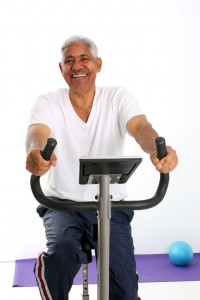Exercise and Alzheimer’s/Dementia
3 Ways Exercise Can Improve Your Quality of Life
 Exercise Helps Your Brain Function Better
Exercise Helps Your Brain Function Better
“Exercise is the single most powerful tool to optimize your brain function,” according to John Ratey, MD, of the Harvard Medical School, author of the book Spark: the Revolutionary New Science of Exercise and the Brain. Aerobic exercise—the kind that gets your heart pumping like jogging or walking fast– is correlated with improved memory, planning and problem solving ability and overall brain function.
In other research on the impact of exercise on brain function, Dr. Arthur Kramer, a neuroscientist at the University of Illinois, notes that exercise improves blood circulation to the brain and can literally increase the white matter in your brain. Several new studies also indicate that aerobic exercise may slow the onset and progression of Alzheimer’s Disease and can actually reverse brain cell deterioration associated with aging.
Exercise Helps Your Body Function Better
Exercise also has a significant positive impact on overall body function. One of the reasons exercise is so beneficial is that it reduces inflammation in your body which plays a role in many chronic health conditions including Alzheimer’s and dementia, heart disease, diabetes, and cancer. In addition, exercise increases your strength and flexibility. It also boosts the immune system and can help improve your sleep.
There is considerable research on the benefits of exercise for improving body function and quality of life. One study published in the Journal of the American Geriatrics Society found that a simple exercise program (1 hour twice a week) for nursing home patients with Alzheimer’s Disease slowed their decline in ability to perform activities of daily living (ADLs). A New York Times report on a long-term study of the impact of fitness on overall health later in life concluded, “Typically, the most aerobically fit people lived with chronic illnesses in the final five years of their lives, instead of the final 10, 15 or even 20 years.” Being physically fit can dramatically improve your overall body function which in turn improves your quality of life and your ability to live independently.
Exercise Can Improve Your Energy and Outlook
Exercise will have a positive impact on your energy level and stamina, your mood, and your ability to handle stress. Depression often goes hand in hand with a diagnosis of Alzheimer’s, and stress is an unwelcome byproduct of illness and disease for both the one with the disease and the caregiver. Many doctors use exercise as the first line of treatment against depression and other mood disorders because it sparks a series of physiological responses that help people weather stress and break negative thought patterns.
Exercise can be even more beneficial if you make it a social activity with other people—you’ll enjoy camaraderie as well as accountability. Both the exercise and the social interaction can improve your outlook and energy level and give you a sense of purpose and well-being.
Get Moving and Try Something New!
Enjoy the great outdoors. Take a brisk walk or run. Go for a hike. Walk the dog. Ride a bike. Walk to a local restaurant or store.
Head to the gym. Try a class. Get an aerobic workout on a stationary bike, treadmill or elliptical machine. Lift weights. Swim.
Around the house and yard. Garden. Vacuum the floor to music. Mow the lawn. Rake the leaves. Plant a tree for posterity.
Join a team. Enjoy some bowling, volleyball, bocce ball or tennis.
Join a class or try a new workout video. Aim for variety and try something new like yoga, tai chi, pilates, dance or water aerobics.
Play! Have fun. Skip. Play tag or dodgeball or table tennis. Find some kids and make (and do!) an obstacle course with them. Try some “silly walks” backwards or sideways, on your heels or on your toes. Stand on one foot while brushing your teeth. Be creative!
It’s never too late to benefit from exercise. Start small—even a little activity is better than none. Talk to your doctor about safe ways to add exercise into your routine.
The information shared here is not intended as medical advice or treatment, but only to raise awareness of current research as well as possible treatment options you can explore in partnership with a qualified health care professional. The benefits and risks of all treatment options should be discussed with a qualified healthcare professional before implementation.
